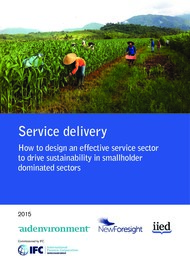The role of voluntary sustainability standards in scaling up sustainability in smallholder-dominated agricultural sectors

Concerns about the sustainability of commodity production have increased rapidly in the last decade, resulting in a call for consumer and supply chain responsibility. Failing public sectors paved the way for the emergence of market-driven initiatives, notably voluntary sustainability standards (VSS). VSS have become a dominant instrument to promote sustainability in many commodity supply chains. As the reach and impact of VSS become more visible, we are reminded that VSS are not the solution for every sustainability challenge. Indeed, this was never their intention. While VSS try to respond to a call for increased scale and impact – at low cost – creating fully sustainable sectors demands complementary or alternative approaches. This is especially necessary in sectors dominated by unorganised smallholders where increased capacity building, input delivery and finance, as well as~other systemic changes such as land tenure, are prerequisites for a viable and sustainable sector. Mainstreaming sustainability in such sectors requires a more holistic model that achieves scale beyond individual supply chains.
This paper begins with an introduction to VSS’ current value proposition, some of the challenges they are confronted with and how their typical response to these challenges. It then presents a more holistic model to scale sustainability in smallholder dominated agricultural sectors and explores the potential role VSS can play within such model.
Cite this publication
Available at https://www.iied.org/16586iied



